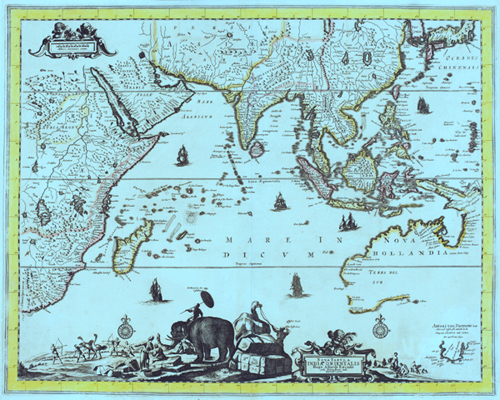.gif)

| . |
 .America, a country whose corrupt and inept banking and financial system is bringing down the whole world economy...(Ric)
.America, a country whose corrupt and inept banking and financial system is bringing down the whole world economy...(Ric)
President Obama visited the CIA's headquarters in Langley, Va., on Monday, soon after his decision to release Bush-era memos that offered a legal justification for the use of harsh interrogation tactics.Getty Images
NPR.org, April 22, 2009 ·President Obama has long insisted that he wants to look forward — not back — at the alleged misdeeds of Bush administration officials who signed off on harsh interrogation tactics after the terrorist attacks of Sept. 11.
But that path to the past became increasingly inevitable in recent days.
First came the release of controversial Bush-era torture memos that detailed the administration's legal justifications for the use of extreme tactics.
Then came reports — the results of a Senate Armed Services Committee investigation — revealing that the controversial interrogation method of controlled drowning, known as waterboarding, was proposed by the CIA in 2002, shortly after the capture of a suspected terrorist, and three months before Bush lawyers secretly approved the technique. Those aggressive techniques, the investigation found, were exported to military detainee facilities, including Iraq's Abu Ghraib prison.
And so, though Obama's chief of staff, Rahm Emanuel, appeared to rule out an investigation of the memo's authors just days ago, Obama now says it will be up to Attorney General Eric Holder to determine whether any official broke the law.
'That's Not How History Works'
"The Obama administration had a choice: whether it would cover up Bush administration crimes, thereby becoming complicit, or to hold true to the president's pledges of transparency and accountability," says Amrit Singh, a lawyer with the American Civil Liberties Union.
"He has certainly delivered on transparency by releasing the memos," she said. "But transparency itself wasn't sufficient."
A chorus of voices on the left has long urged Obama to protect his self-touted accountability brand by pursuing an investigation on behalf of a country still debating the merits of what was done, in its name, in the pursuit of national security.
MoveOn.org on Wednesday sent a Web ad to its millions of members, urging them to call on Holder to appoint an independent special prosecutor to investigate the torture memo authors — including Jay Bybee, who is now a federal judge, and John Yoo, now a tenured law professor at the University of California, Berkeley.
An Intelligence Committee memo declassified by the Obama administration contains a committee-generated timeline that indicates that CIA interrogators asked to use waterboarding three and a half months before then-Bush lawyer Bybee wrote a memo signing off on the "enhanced interrogation technique." The timing, officials say, strongly suggests that the memo was shaped by the CIA's request.
Senate Armed Services Committee Chairman Carl Levin (D-MI) told NPR on Wednesday that he wants an independent panel to look into whether top officials who authorized the use of harsh interrogation tactics should be punished.
Meanwhile, historians suggest that presidents, no matter how full their plates — and Obama's is plenty full — simply can't ignore the alleged misdeeds of the previous administration, particularly when those deeds have divided a nation. concerning the enquiry into torture...
In my opinion it will be a long drawn-out judicial procedure with no one taking the blame and no jail time for anyone (Ric)
The global financial sector faces write-downs of $4.1tn (£2.8tn) from the toxic assets that have crashed in value since the start of the credit crunch 20 months ago, the International Monetary Fund said today .
In its first comprehensive study of the impact of the crisis on banks and other financial institutions, the Fund said that it had increased its estimate of the potential losses in the US from $2.2tn to $2.7tn as a result of the deepening economic slump over the past three months. Europe and Japan between them account for $1.3tn of the write-downs, with UK banks facing losses of $316bn (£216bn).
The Fund warned that the damage to the balance sheets of institutions would take years to fix and would lead to a credit famine in Britain, the US and Europe.
In addition, it said the open-ended taxpayer bailouts provided to the crippled financial sector in recent months risked adding to the debt burdens of western countries already facing a demographic time bomb.
"The global financial system remains under severe stress as the crisis broadens to include households, corporations, and the banking sectors in both advanced and emerging market countries", the IMF said in its half-yearly Financial Stability Report. It called for the redesign of the global financial system to provide a "more stable and resilient platform for sustained economic growth."
Although the Fund said government support packages were helping to stabilise the financial system, it added that further decisive, effective and internationally co-ordinated actions would be needed to sustain the improvement.
"Shrinking economic activity has put further pressure on banks' balance sheets as asset values continue to downgrade, threatening their capital adequacy and further discouraging fresh lending," the report said. "Thus, credit growth is slowing, and even turning negative, adding even more downward pressure on economic activity."
It added that even if policy actions were swift and worked as planned, recovery for the financial sector would be long and painful and economic recovery would be protracted. "The accompanying de-leveraging and economic contraction are estimated to cause credit growth in the US, the United Kingdom, and euro area to contract and even turn negative in the near term and only recover after a number of years."
The IMF said the key challenge was to break the "downward spiral" between a weakened financial system and the global economy. It set out a detailed programme of reforms – including curbs on credit growth during booms, tougher regulation of a limited number of institutions considered "too big to fail" and better cross-border supervision.
Lending between banks came to a halt in August 2007 when the financial markets first became aware of the impact of losses in the US sub-prime mortgage market, but the IMF said there had been some signs of improvement in the interbank markets since the intervention of governments to prevent a global financial meltdown last October.
It added, however, that funding strains had persisted and banks, despite being bailed out by the taxpayer, were still short of capital. "As a result, many corporations are unable to obtain bank-supplied working capital and some are having difficulty raising longer-term debt, except at much more elevated yields."
In its breakdown of the losses on toxic assets, the IMF said two-thirds of the writedowns affected banks. But the FSR warned that pension funds and insurance companies had also been hit hard by the crisis. Pension funds had seen the value of their assets tumble and life insurance companies had suffered losses on equity and corporate bond holdings, in some cases depleting their regulatory capital surpluses.
What's a trillion dollars? A trillion dollars = $1,000,000,000,000. That's 12 zeroes to the left of the decimal point. A trillion is a million million dollars. The U.S. government spends more than the entire Gross Domestic Product (GDP) of Australia, China and Spain combined. If you laid one dollar bills end to end, you could make a chain that stretches from earth to the moon and back again 200 times before you ran out of dollar bills! One trillion dollars would stretch nearly from the earth to the sun. It would take a military jet flying at the speed of sound, reeling out a roll of dollar bills behind it, 14 years before it reeled out one A trillion dollars = $1,000,000,000,000. That's 12 zeroes to the left of the decimal point. A trillion is a million million dollars. The U.S. government spends more than the entire Gross Domestic Product (GDP) of Australia, China and Spain combined. If you laid one dollar bills end to end, you could make a chain that stretches from earth to the moon and back again 200 times before you ran out of dollar bills! One trillion dollars would stretch nearly from the earth to the sun. It would take a military jet flying at the speed of sound, reeling out a roll of dollar bills behind it, 14 years before it reeled out one trillion dollar bills. What is frightening is that government will continue to grow in America unless citizens prevent it. If government stays on the course it's been on for the past forty years without a radical change, the federal government will have a $10 TRILLION BUDGET by the year 2010. Foolish politicians make pronouncements about the strength of the economy. The total debt obligation of the United States now exceeds 46 TRILLION DOLLARS. American workers now net almost 30 percent less in real wages than they did in 1973. After taxes, two paychecks in a family barely equal the purchasing power one had thirty years ago.
 What's a trillion dollars?(It doesn't look much, does it?)
What's a trillion dollars?(It doesn't look much, does it?)








+copy.jpg)






















































.jpg)



























 G
G







.jpg)
















No comments:
Post a Comment